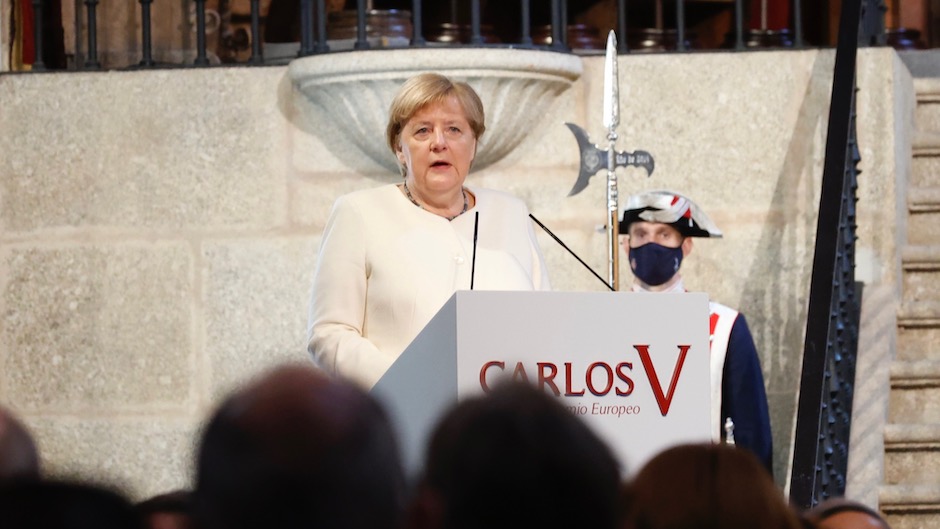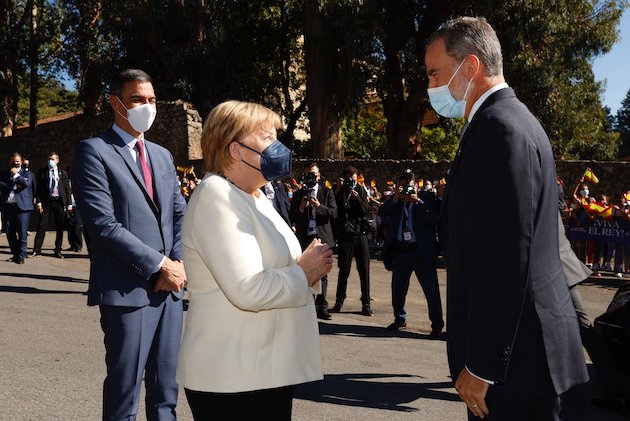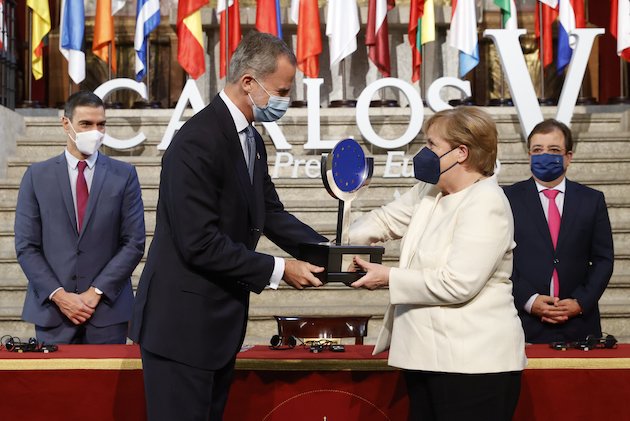The German Chancellor received the Carlos V Award. She appealed to defend the EU values and to strengthen cooperation and unity to face the future challenges.
 Angela Merkel, during her speech at the Carlos V Award. / © Casa de S.M. el Rey
Angela Merkel, during her speech at the Carlos V Award. / © Casa de S.M. el Rey
German Chancellor Angela Merkel received this Thursday the 14th Carlos V European Award, a prize that honours those who “enhance Europe's cultural and historic values”.
She received the award from the King of Spain, Felipe VI, in the presence of national and international authorities, at the Royal Monastery of Yuste,in the Spanish city of Caceres.
This was probably one of her last political speeches at international level, given that she will soon be leaving the German chancellorship and with it, political activity on the front line.
Her speech, however, was not a review of the past, but rather an overview of the present and the future of the European Union and the challenges it will have to face.
“As the daughter of an evangelical pastor, it is an honour for me to receive the award named after Charles V in Yuste", started Merkel with a smile, recalling the troubles that the advance of Protestantism in Europe had caused the monarch.
The Chancellor used the anecdote to emphasise the importance of the value of tolerance in today's Europe, recalling that peace and freedom “must never be taken for granted", but it has to be protected and defended.
“We have to be aware that the idea of the European project allows us to live in peace and freedom. But today we are also confronted by aggressions and attacks on our liberal order and democracy. Whether it is terrorism, xenophobia, anti-Semitism or any other threat, we must remain vigilant", said Merkel.
She stressed that “Europe can only be as strong as it is united, and can only be united to the extent that it sees itself as connected by common values. Inwardly united, outwardly strong, that is our guiding principle for coexistence in the EU, which required close cohesion as well as trust and respect”.

Merkel acknowledged that, because of her experience, she knows how difficult it is to draw up common policies in Europe, although she believes that in recent years the EU's responses to economic, political and social challenges have been positive.
She recalled that “whenever things got difficult, the EU stood united, and I think we will continue along this path. We cooperate in European politics because it helps to strengthen us internally”.
“That’s why we must always be prepared to adopt and weigh up very different arguments, well aware that the diversity of knowledge and experience is a wealth, a valuable resource which should be used for the welfare of all”, pointed out the Chancellor.
In this context, Merkel addressed the coronavirus pandemic, stating that that “initially, the countries sought safety in isolation”, but then “a great deal had been achieved together” with “ important advances in research and vaccination”, as well as the “European Next Generation EU economic recovery plan, which is unique in its dimensions”.
For Angela Merkel, recovery must go hand in hand with energy technology development, which requires environmentally friendly investment. “Modernity and ecology go hand in hand, this is the Green Deal that we must move to”.
She also underlined that it is necessary to set the goal of “climate neutrality in 2050”, something “very ambitious because it implies changes in the way we live, consume and move around".
For the Chancellor, this transformation will be an opportunity “for development, for the market, for new technologies”.
“Far too often, too much is said about the cost of climate protection and far too little about the cost of neglecting climate protection”, she added, recalling the serious damage caused by the floods in Germany this summer.
Merkel pointed to the need to invest in technology to enhance the opportunities of digitalisation, framed by new markets such as artificial intelligence or quantum technologies, and warned of China's growth, as an issue to which the EU must seek a common response.

To address these investment challenges, Merkel believes that the EU needs to be able to take joint decisions “faster than in the past and to act in solidarity, making forecasts in good economic times in order to deal with crises”.
“Centrifugal forces had been working in the European Union, resulting in social developments happening at different speeds”. “If, in these cases, short or medium-term national interests are placed above the benefit of the common European project and the legal basis, this results in an imbalance”, Merkel said.
According to Chancellor, the the EU must respond “remaining in honest dialogue with each other and stressing our common values”, such as "respect for human dignity, equality, respect for the rule of law, and the protection of minorities”.
Looking to the future, Merkel considered that the EU must be “more proactive, improve our coordination and make it more independent: not isolate ourselves, but act strategically”.
“Europe is a godsend for us all – a godsend which it is our privilege but also our duty to protect and shape”. concluded the Chancellor.

Las opiniones vertidas por nuestros colaboradores se realizan a nivel personal, pudiendo coincidir o no con la postura de la dirección de Protestante Digital.
Si quieres comentar o